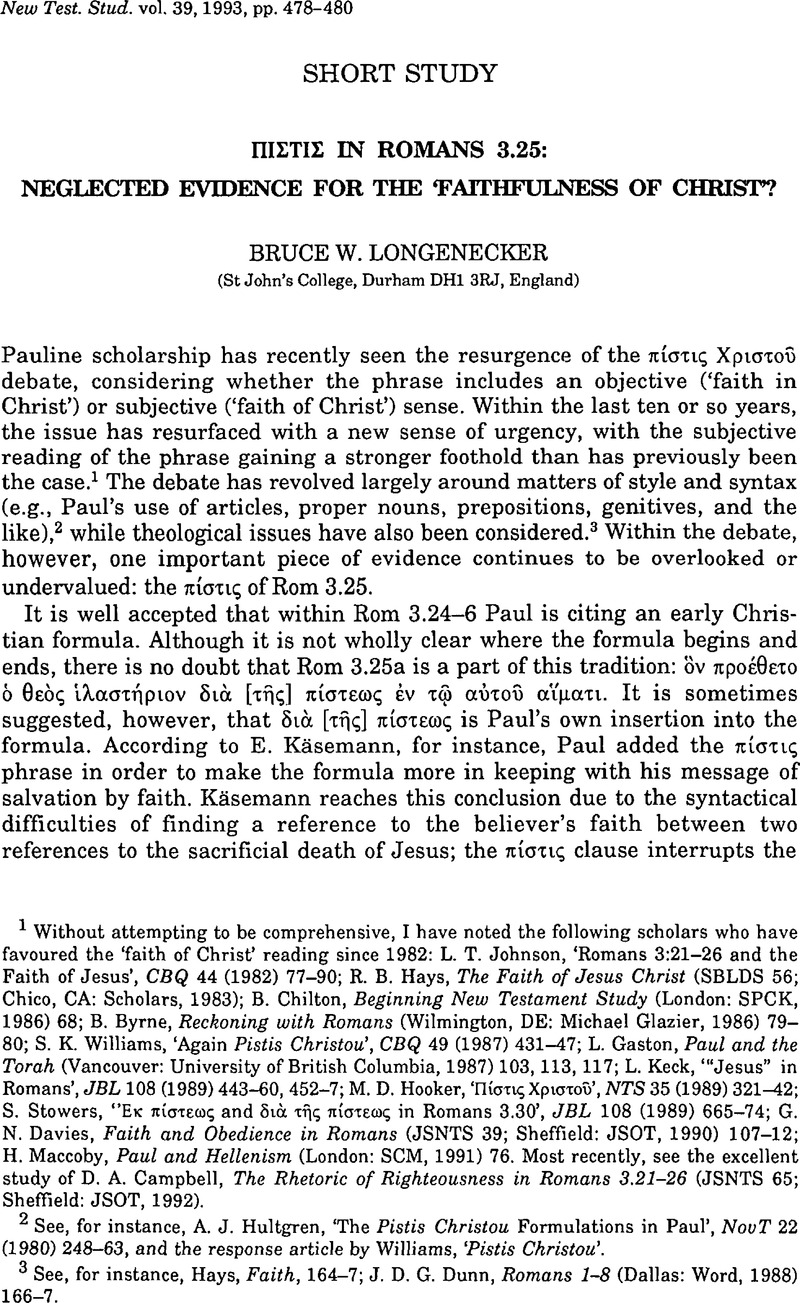Article contents
ΠΙΣΤΙΣ in Romans 3.25: Neglected Evidence for the ‘Faithfulness of Christ’?
Published online by Cambridge University Press: 05 February 2009
Abstract

- Type
- Short Study
- Information
- Copyright
- Copyright © Cambridge University Press 1993
References
1 Without attempting to be comprehensive, I have noted the following scholars who have favoured the ‘faith of Christ’ reading since 1982: Johnson, L. T., ‘Romans 3:21–26 and the Faith of Jesus’, CBQ 44 (1982) 77–90Google Scholar; Hays, R. B., The Faith of Jesus Christ (SBLDS 56; Chico, CA: Scholars, 1983);Google ScholarChilton, B., Beginning New Testament Study (London: SPCK, 1986) 68Google Scholar; Byrne, B., Reckoning with Romans (Wilmington, DE: Michael Glazier, 1986) 79–80Google Scholar; Williams, S. K., ‘Again Pistis Christou’, CBQ 49 (1987) 431–47Google Scholar; Gaston, L., Paul and the Torah (Vancouver: University of British Columbia, 1987) 103, 113, 117Google Scholar; Keck, L., ‘“Jesus” in Romans’, JBL 108 (1989) 443–60, 452–7Google Scholar; Hooker, M. D., ‘Πίστις Χριστο![]() ’, NTS 35 (1989) 321–42CrossRefGoogle Scholar; Stowers, S., ‘Έκ πίστεως and δι⋯ τ⋯ς πίστεως in Romans 3.30’, JBL 108 (1989) 665–74Google Scholar; Davies, G. N., Faith and Obedience in Romans (JSNTS 39; Sheffield: JSOT, 1990) 107–12Google Scholar; Maccoby, H., Paul and Hellenism (London: SCM, 1991) 76Google Scholar. Most recently, see the excellent study of Campbell, D. A., The Rhetoric of Righteousness in Romans 3.21–26 (JSNTS 65; Sheffield: JSOT, 1992).Google Scholar
’, NTS 35 (1989) 321–42CrossRefGoogle Scholar; Stowers, S., ‘Έκ πίστεως and δι⋯ τ⋯ς πίστεως in Romans 3.30’, JBL 108 (1989) 665–74Google Scholar; Davies, G. N., Faith and Obedience in Romans (JSNTS 39; Sheffield: JSOT, 1990) 107–12Google Scholar; Maccoby, H., Paul and Hellenism (London: SCM, 1991) 76Google Scholar. Most recently, see the excellent study of Campbell, D. A., The Rhetoric of Righteousness in Romans 3.21–26 (JSNTS 65; Sheffield: JSOT, 1992).Google Scholar
2 See, for instance, Hultgren, A. J., ‘The Pistis Christou Formulations in Paul’, NovT 22 (1980) 248–63Google Scholar, and the response article by Williams, ‘Pistis Christou’.
3 See, for instance, Hays, Faith, 164–7; Dunn, J. D. G., Romans 1–8 (Dallas: Word, 1988) 166–7.Google Scholar
4 Käsemann, E., Commentary on Romans (trans. Bromiley, G. W.; Grand Rapids: Eerdmans, 1980) 98.Google Scholar
5 Moreover, the concept of God's covenant fidelity is mentioned later in the formula by the term δικαιοσύη, rather than πίστις (3.25b-26).
6 Cf. Gaston, Torah, 113,172.
7 Paul's charge, of course, is the product of a highly polemical argument, and has little substance outside of that arena. For Paul's argument to work, the success of Jesus requires the failure of Israel as a necessary precondition. For fuller treatment of Paul's dialogue with ‘the Jew’ of Romans 2–3, see my Eschatology and the Covenant: A Comparison of 4 Ezra and Romans 1–11 (JSNTS 57; Sheffield: JSOT, 1991) 172–202.Google Scholar
8 Cf. C. F. D. Moule: in Paul's presentation, ‘Jesus Christ epitomizes Israel – indeed, is Israel’ (‘Jesus, Judaism and Paul’, Tradition and Interpretation in the New Testament [ed. G. F. Hawthorne, O. Betz; Grand Rapids: Eerdmans/Tübingen: Mohr, 1987]) 43–52, 45Google Scholar. I have been influenced here expecially by the work of N. T. Wright. With reference to Paul's thought, see his The Climax of the Covenant (Edinburgh: T. & T. Clark, 1991)Google Scholar; with reference to Jesus' ministry, see his ‘Jesus, Israel and the Cross’, SBL 1985 Seminar Papers (ed. K. H. Richards; Atlanta: Scholars, 1985) 75–95Google Scholar. To my knowledge, Wright has yet to advocate the reading ‘faithfulness of Christ’.
- 4
- Cited by


